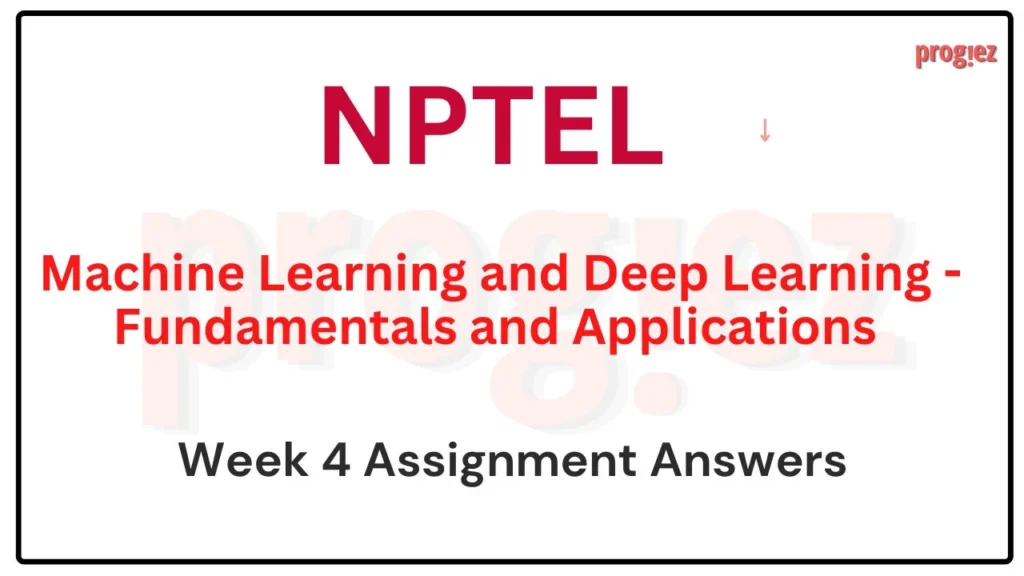ML Deep Learning Fundamentals Applications Week 4 Answers
Are you searching for reliable ML Deep Learning Fundamentals Applications Week 4 Answers 2024? Look no further! Our solutions are designed to provide clear, detailed answers, helping you navigate your NPTEL course with confidence.
Table of Contents

ML Deep Learning Fundamentals Applications Week 4 Answers (July-Dec 2024)
1. How many decision boundaries are in one-vs-all classification?
A) ( c )
B) ( \frac{c(c−1)}{2} )
C) ( \frac{c(c+1)}{2} )
D) None of the above
Answer: Updating soon (in progress)
2. To avoid the problem of an ambiguous region of a linear discriminant function for ( c ) categories, we can:
A) Define ( c ) linear functions ( g_i(x) ), one for each class for ( i = 1, 2, \dots, c )
B) Assign ( x ) to ( w_j ) if ( g_i(x) < g_j(x) ) for all ( i \neq j )
C) Take a linear machine classifier
D) All the above
Answer: Updating soon (in progress)
3. Which of the following statements is true about the learning rate in Gradient Descent?
A) A very high learning rate may lead to oscillation
B) A lower learning rate may lead to faster convergence
C) The learning rate doesn’t determine the size of the steps taken towards the minimum
D) The learning rate has no effect on the convergence of Gradient Descent
Answer: Updating soon (in progress)
4. In the Perceptron algorithm for a binary classifier, what happens to the weights when a positive misclassified point is encountered?
A) It remains the same
B) It is increased
C) It is decreased
D) It is multiplied by a constant
Answer: Updating soon (in progress)
These are ML Deep Learning Fundamentals Applications Week 4 Answers
5. Let ( w_{ij} ) represent the weight between node ( i ) at layer ( k ) and node ( j ) at layer ( (k-1) ) of a given multilayer perceptron. The weight update using the gradient descent method is given by:
A) ( w_{ij}(t+1) = w_{ij}(t) + \alpha \frac{\partial E}{\partial w_{ij}}, \, 0 \leq \alpha \leq 1 )
B) ( w_{ij}(t+1) = w_{ij}(t) – \alpha \frac{\partial E}{\partial w_{ij}}, \, 0 \leq \alpha \leq 1 )
C) ( w_{ij}(t+1) = \alpha \frac{\partial E}{\partial w_{ij}}, \, 0 \leq \alpha \leq 1 )
D) ( w_{ij}(t+1) = -\alpha \frac{\partial E}{\partial w_{ij}}, \, 0 \leq \alpha \leq 1 )
Answer: Updating soon (in progress)
These are ML Deep Learning Fundamentals Applications Week 4 Answers
6. A 4-input neuron has weights 3, 4, 5, and 6. The transfer function is linear with the constant of proportionality being equal to 3. The inputs are 6, 12, 10, and 20 respectively. What will be the output?
A) 238
B) 76
C) 708
D) 123
Answer: Updating soon (in progress)
7. Which of these is true about discriminant classifiers?
A) Assume conditional independence of features
B) Robust to outliers
C) Can perform classification if some missing data points are present
D) All the above
Answer: Updating soon (in progress)
8. A set of training samples is given below. Using Support Vector Machine algorithm, the Marginal line for the classification can be calculated as:
A) ( -5.32x_1 – 7.193x_2 + 9.09 = 0 )
B) ( -6.67x_1 + 8.134x_2 – 9.09 = 0 )
C) ( -7.21x_1 – 9.173x_2 + 9.09 = 0 )
D) ( 8.21x_1 + 7.12x_2 – 9.09 = 0 )
Answer: Updating soon (in progress)
9. Referring to Question 8, a new test sample (0.5, 0.5) is found. The class of the given sample is:
A) Positive
B) Negative
C) Both classes
D) Can’t say
Answer: Updating soon (in progress)
10. What is the main objective of a Support Vector Machine (SVM)?
A) To maximize the number of support vectors
B) To minimize the margin between classes
C) To maximize the training accuracy
D) To find a hyperplane that separates classes with the maximum margin
Answer: Updating soon (in progress)
These are ML Deep Learning Fundamentals Applications Week 4 Answers
All weeks of Introduction to Machine Learning: Click Here
More Nptel Courses: https://progiez.com/nptel-assignment-answers